12 Etiquette Tips You Need To Follow On A Bourbon Distillery Tour, According To Industry Experts
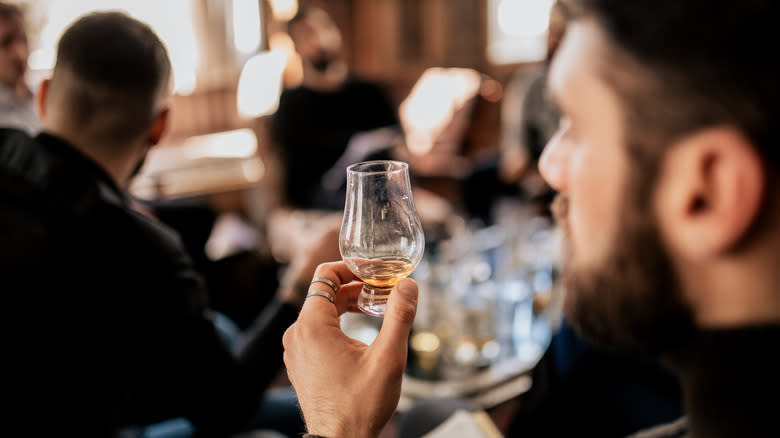
For those who love visiting world-class distilleries, particularly those of the bourbon variety, exploring the Kentucky Bourbon Trail is the best way to line up an action-packed day of learning, sightseeing, and, of course, tasting whiskey. For bourbon lovers, a distillery tour is huge fun, but there are a few etiquette tips to keep in mind to ensure that you and the other guests have the best experience possible.
We've gathered expert advice from some of the best bourbon brands to give us first-hand insight into how to be on your best behavior while on a bourbon distillery tour. Angel's Envy distillery operations manager Damian Gallaher and distillery general manager Dee Ford discussed these etiquette tips. Additionally, we spoke with assistant general manager at Michter's Distillery, Anne Mae, for her useful advice on the dos and don'ts of distillery touring.
Along with these experts, I've also worked as a brand ambassador in spirits, conducting large consumer tastings and events. I know that customer behavior and engagement can be what makes or breaks a session. Folks spend plenty of time, money, and attention when planning a trip on the Bourbon Trail; these etiquette tips can equip you with the knowledge to have fun, stay safe, and contribute to everyone's enjoyment.
Read more: Styles Of Regional BBQ In The US
Book In Advance
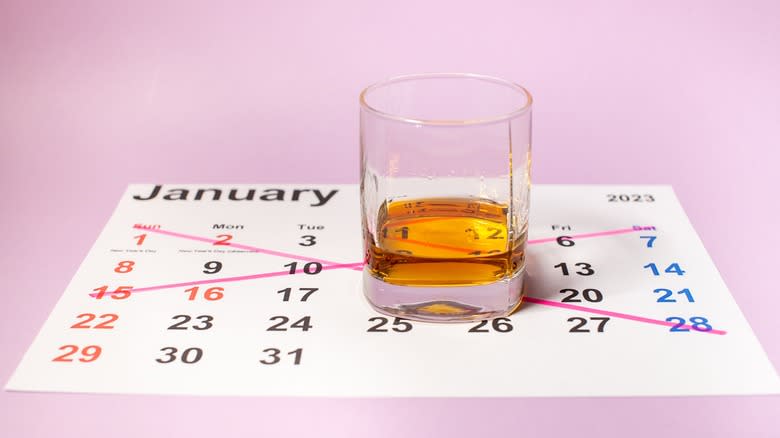
Benjamin Franklin once said, "By failing to prepare, you are preparing to fail." Whether or not he was saying this in reference to attending a bourbon distillery tour is unclear, but the advice remains sound nonetheless. Luckily, Damian Gallaher from Angel's Envy echoes this same sentiment, with some practical advice. "Book in advance. Bourbon tourism is booming. Although some distilleries may have walk-in opportunities for tours and tastings, these are the exception, not the rule."
Gallaher explains that if you're setting your expectations high and going to the effort to travel to a distillery, taking the time to make a booking is well worth it. "Nothing is worse than planning a dream trip to Bourbon Country only to find out your favorite distillery is sold out". Having a booking locked in at your distillery of choice means you don't have to cause unnecessary stress for the staff in trying to deliver a satisfying experience.
Booking a distillery tour is convenient enough, and guests can book easily on distillery websites. This also gives an opportunity to discover the full range of options at your chosen distillery. Anne Mae from Michter's recommends looking ahead in this way, with yet more useful advice. "Do some research about the distillery you plan to visit and learn about the different tours and experiences they offer." Planning ahead for all the distillery experiences you want to do is another way to avoid causing confusion or disruption when you arrive.
Be On Time
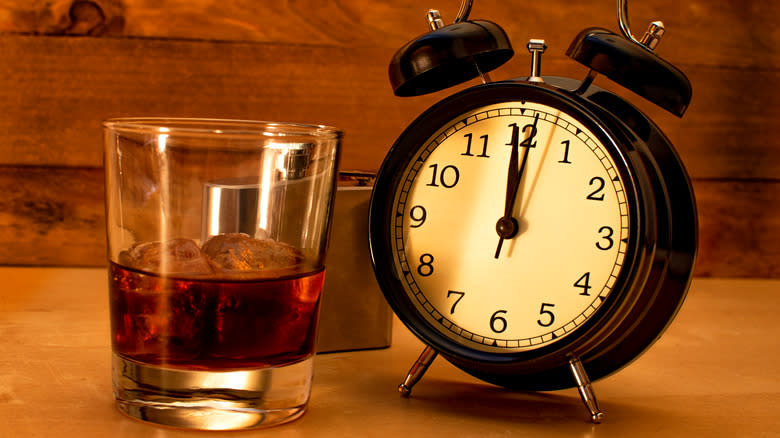
Distilleries can be bustling places, and often tours run like clockwork to a schedule. Being on time is the best way to keep your end of the bargain as a visitor. Anne Mae recommends you arrive at least 10 minutes early to give you time to check in and familiarize yourself with the facility. Damian Gallaher echoes this sentiment, stressing the importance of being on time. "Please keep in mind that there most likely is a tour right before yours and right after yours. For these to run smoothly and not impact the experiences of others, they have to start and end on time."
Not only does it pay to manage your time prior to attending a distillery tour, but Gallaher also describes how staying conscious of your timekeeping and scheduling can save you hassle down the line. This is especially true when lining up an action-packed day on the bourbon trail. "Make sure you have allotted sufficient time to get to each location," says Gallaher, "and avoid overextending yourself. More stops do not always equal more fun." Of course, as Gallaher also points out, not fitting everything you want to see into a single trip just gives you an excuse to return.
Leave The Kids At Home
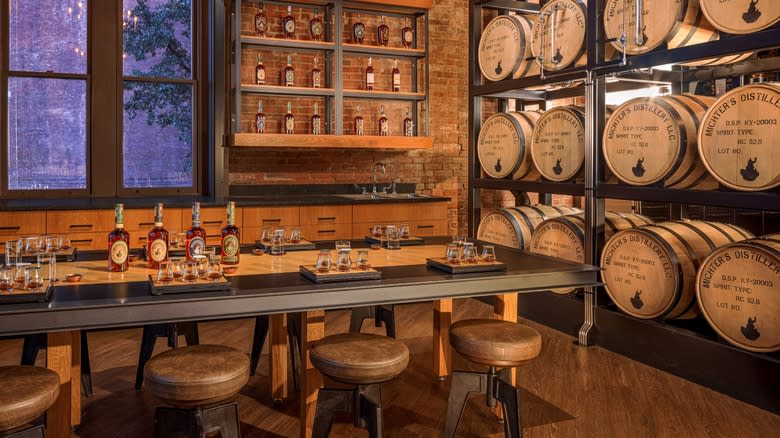
This is an easy one to overlook. Your mind is fixated on the bourbon-fueled adventure ahead of you; the whole family is in the car for the day ... and you arrive to find out that the kiddies don't really fit into this vision. Damian Gallaher explains that there are some valid reasons for distilleries stopping children at the door. "Some distilleries are able to accommodate children; some are not. There are legal guidelines all distilleries must adhere to regarding the presence of minors. Always check before you go." Arriving with children when there are legal reasons they're not allowed on-site can put staff in an awkward position as they have to ask you to remove them from the premises.
Of course, legal regulations aren't the only considerations when bringing children to a bourbon distillery. Gallaher continues: "Even if your destinations do allow for children, please keep in mind it may impact the adults in your group and what they are able to do at the distillery." For obvious reasons, bourbon distilleries may not be as interesting to kids as they are to adults, so it may just be better for everyone if they don't get dragged along.
Ask Questions
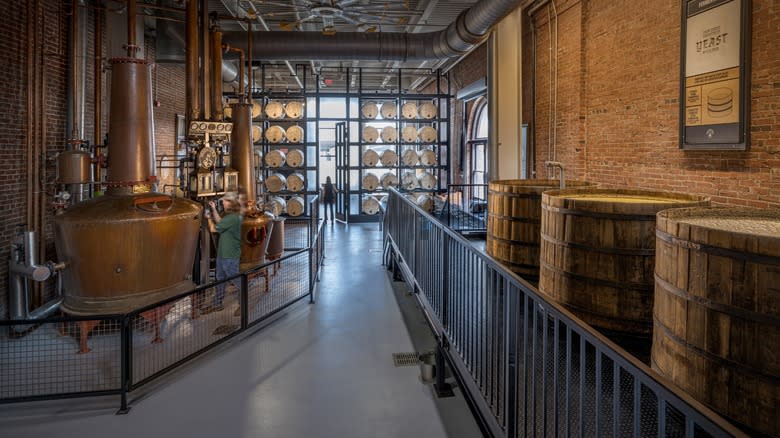
When speaking to a large group of people, there's nothing worse than a silent audience. Whether guiding guests through the distillery or stepping them through the intricacies of bourbon's flavors and aromas, a group that's tongue-tied can make it difficult to stimulate engagement and raise the tour's energy. The best way to improve your own experience on a bourbon tour, as well as that of the other guests, is to ask questions.
This is one of Damian Gallaher's key etiquette tips for visitors. "Don't be afraid to ask questions -- even if you think they're silly. If you're wondering about something, so are others in your group." What's more, asking many questions is actually helpful to tour guides, as it helps them connect with the group. Gallaher explains that guests having questions is actually preferable. "Kentucky Bourbon Trail guides are some of the most knowledgeable bourbon experts in the world. They love to share their knowledge with brand-new whiskey enthusiasts and lifelong enthusiasts alike."
Anne Mae also suggests asking lots of questions during your tour, reminding guests to ask not only about the qualities of the final products but also how the production process impacts them. If you have any uncertainties about what particular equipment does, how different ingredients are added, or who does what, putting your hand up is certainly encouraged. "Your tour guide is there to help you learn and appreciate the art of making whiskey."
Remember, It May Be Someone Else's First Time
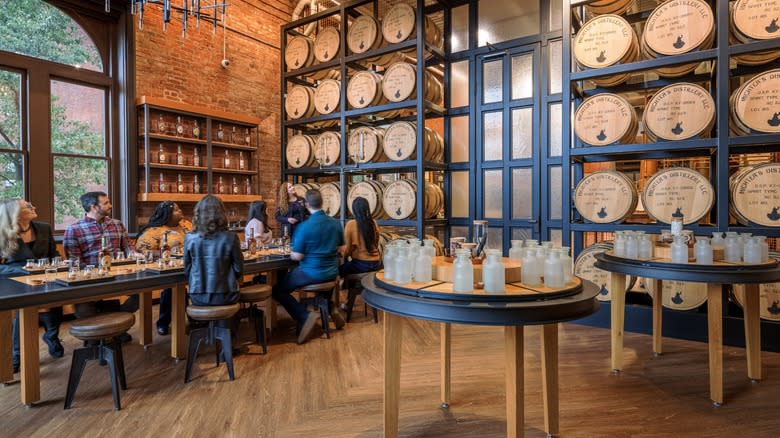
Chances are, at some point, you've attended an event, tour, or tasting with that one know-it-all in the corner who's just bursting to show off their expertise. Damian Gallaher reminds guests that even if they're already familiar with the distillery's products and processes or have an encyclopedic knowledge of bourbon, it's important to remember that may not be the case for all guests. "If you've heard the bourbon laws four times that day, then one, you've booked too many experiences for one day," he says. "Two, there are probably others on their first tour."
Gallaher explains that although it's wonderful if you have extensive bourbon knowledge or know more than others are offering in the group, the respectful thing to do is to keep it to yourself. It's important to trust your tour guide to touch on relevant concepts in their own time. Just because they haven't mentioned a particular fact or explained a stage in distilling doesn't mean that information doesn't have an intentional place later in the tour. It's important to engage and ask questions, but avoid using questions as a way to demonstrate your knowledge.
Keep An Open Mind
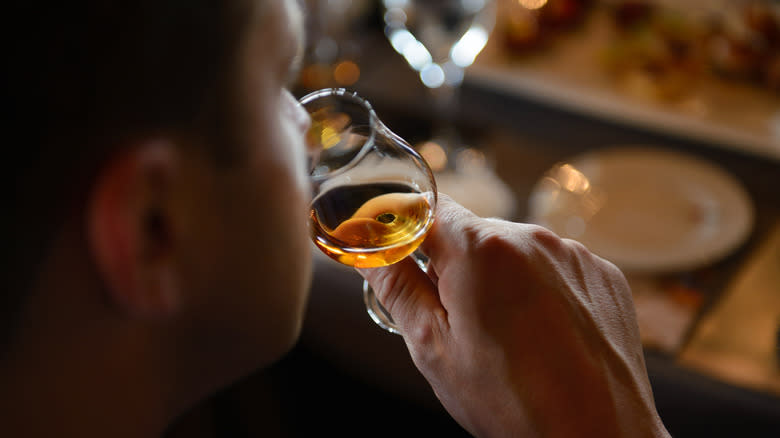
Whether bourbon is your chosen tipple or not, it's important to keep an open mind when attending a bourbon distillery tour. Even if you've decided bourbon isn't for you, being open to new experiences and information can only improve your experience and help the tour guide. A group of open-minded visitors who're there to learn makes it much easier to engage with and deliver an enjoyable experience.
"During the tour, keep an open mind and be willing to try spirits that you might not typically drink or are not familiar with. This will allow you to explore new flavors and expand your palate," suggests Anne Mae. "Keep in mind that our taste preferences change over time, so you might discover a new favorite expression during the tasting."
Perhaps there's a bourbon with less corn and more rye that sparks unexpected joy. Maybe you find that with a promising bourbon and chocolate pairing, your experience of a whiskey you've previously written off gets a new lease on life. Your guide isn't there to trick you into liking bourbon but to suggest different ways to enjoy the spirit that may open up new doors of enjoyment.
Pace Yourself
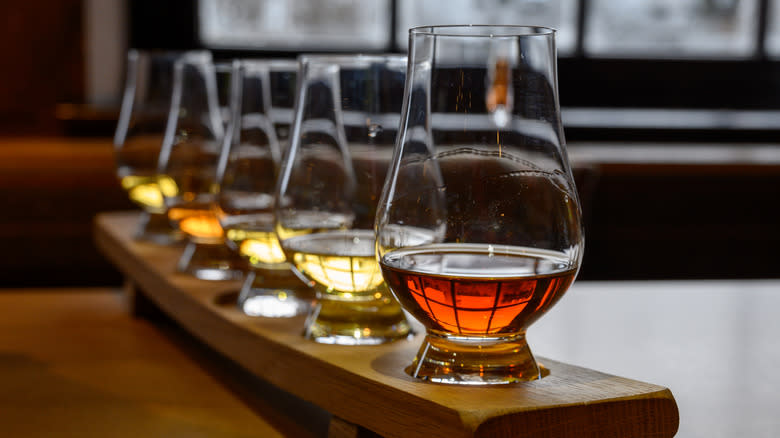
Wineries, breweries, and distilleries are all places where it's easy to get a little carried away. It makes sense; you're literally at the source of your favorite products. The golden ticket winners who went to the chocolate factory hardly exercised much restraint, but then, it didn't work out so well for most of them. Even if you're most looking forward to the part where you get to actually drink the bourbon, it's essential that you stay mindful of your consumption.
Damian Gallaher offers this advice -- "Pace yourself. Distilled spirits have a higher proof -- these are not wine tastings. For context, many wines are roughly 25 proof. The whiskeys you will be tasting will be anywhere from 80 proof to over 120 proof." Pacing yourself doesn't just mean being conscientious of the whiskey to enjoy at one site. For many, a distillery tour is just one stop-off of many on the Kentucky Bourbon Trail. Gallaher also has a recommendation for how many visits to squeeze into one day. "Three tastings (most tastings will involve multiple pours) over the course of a day is about where you want to be."
Be Attentive

When we said there's nothing worse than a quiet audience, that wasn't actually true. There is one thing worse than a quiet audience, and that's an audience that doesn't pay attention in the first place. Imagine guiding a group of people through the distillery grounds, and a few members wander off or chat loudly the whole way through. Being inattentive can make it harder for the tour guide and disrupt the experience for the rest of the group.
This doesn't just apply to the moving tour of the facility but the tasting experience as well. "Listen to what your tasting guide says to get the most out of your bourbon tasting," says Damian Gallaher.
Typically, the more alcohol a group consumes, the more chatty they become. While this may stimulate more question-asking, it can also mean more disruptive talking at the back of the class. It's important to be mindful of the ongoing presentation and remain attentive throughout. Groups usually get a chance to have a chat amongst themselves at some point during a tour or tasting, so just sit tight and stay focused while enjoying the tour.
Follow Instructions
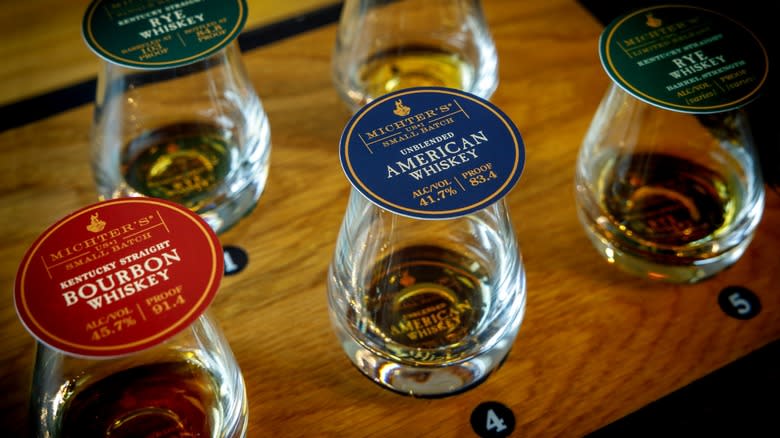
While you may be a seasoned bourbon distillery visitor or just be holding out for that delicious bourbon reward at the end, it's essential that you follow instructions throughout. A distillery tour is a carefully curated experience, and it's bad etiquette to jump the gun. Damian Gallaher urges visitors to listen to everything the tour guide says and follow instructions carefully. "Don't sit down and immediately drink the bourbon sample in front of you."
Dee Ford, Angel's Envy distillery general manager, reminds us that there's more to enjoying whiskey than just sipping. "Wait for your guide to talk you through the process. Nosing is just as important as tasting." Whether or not you already know how to taste bourbon like a pro, it's essential that you listen to the instructions your guide gives you throughout. For example, you may not know from looking at it that a bourbon is high enough proof to scorch your nose clean off, but your guide may warn you to proceed with caution or nose the bourbon from a distance. If you dive your nose right in without taking the time to listen, you may end up with regretful tears in your eyes.
Share Your Opinions On Tasting Notes
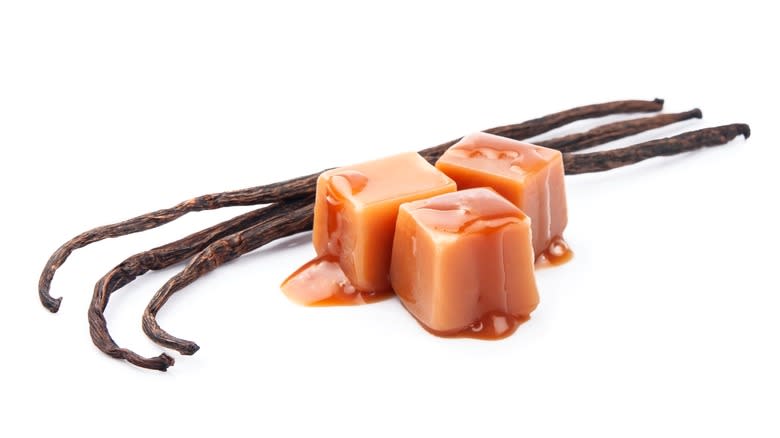
While there are certain times during a distillery tour when your ears are more useful than your mouth, sharing your opinions can be a great way to engage with the tour guide and positively contribute to the experience. The key is to wait until an appropriate moment to share your opinions without interrupting the tour or derailing the tasting. Typically, a tour guide will ask for tasting notes or opinions, and when they do, sharing is encouraged.
As Dee Ford instructs: "Do share your personal tasting notes when asked by your guide. They like to get your input, which makes it more fun for everyone. Someone else may be thinking of the same tasting notes as you." Mentioning that you can taste notes like cocoa, vanilla, citrus, or caramel can actually help other guests connect with those characteristics and even help them find their own. If you sometimes struggle to find flavors or aromas, looking over a bourbon-tasting wheel before or during your tasting can help stimulate the recognition of notes in the bourbon.
Usually, as soon as one guest goes out on a limp and shares what they're tasting, others gain the courage to do the same. It's always helpful to take one for the team and be the first to share your tasting notes when asked.
Thank Your Guide At The End
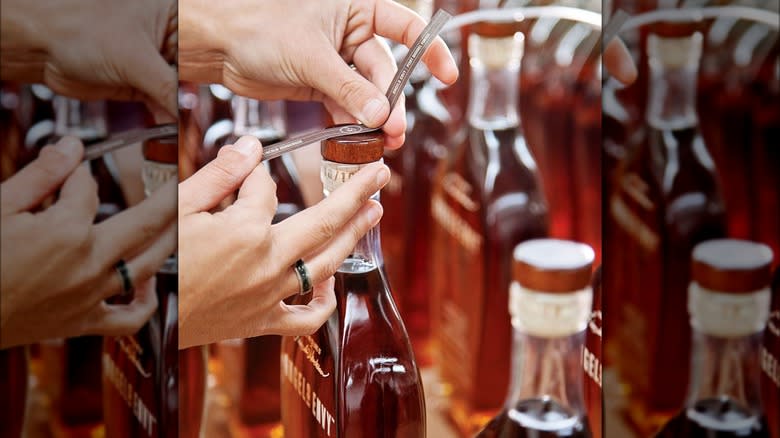
It may seem basic, but remembering your manners is also a part of good bourbon distillery tour etiquette, including saying thank you. "Do consider thanking your guide if you enjoyed their tasting process," Dee Ford says. Distillery tour guides put a huge amount of effort into ensuring that your experience is enjoyable, informative, and unique. This also means treating every new group like welcome guests while being friendly and attentive to their needs.
A brief thank you is the fastest way to show that you appreciate this effort and assure the guide that you had a positive experience. Thanking your guide is also extremely helpful to new or less-experienced tour guides. Thanking them after the tour can let them know they're doing well and help them hone their abilities as tour guides. If you have constructive feedback, this can also be helpful but remember that too much criticism can undermine a thank you.
Gratuity Is Always Appreciated
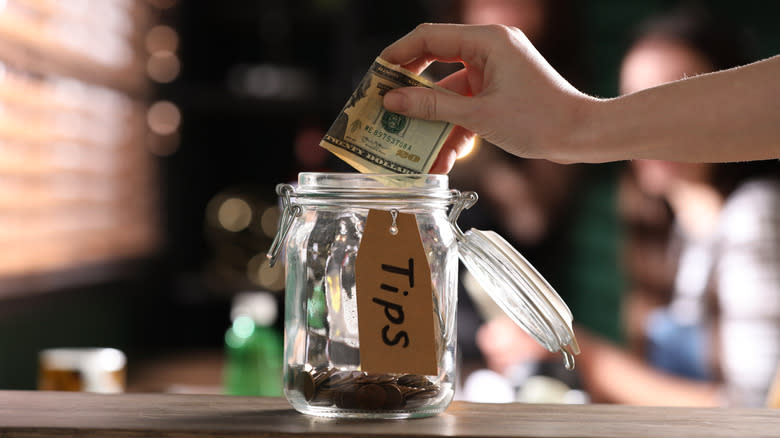
Of course, there are many ways to thank your tour guides, and a popular way is with a cash gratuity. While a tip is not always expected, as Dee Ford describes, "Gratuity is always appreciated." If it feels appropriate to leave a small gratuity for your tour guide, this is an effective way to thank them for the experience and encourage them to continue their good work.
Deciding a reasonable tip for a distillery tour is similar to determining how much you should tip for dinner. You may consider the cost of the tour and decide an appropriate amount relative to this amount, using 20% as a starting point. Alternatively, you can decide on a reasonable amount proportional to the experience and your appreciation.
It can also be helpful to consider the length of the experience. For example, up to $10 can be a reasonable amount for a half-day experience, while for a full-day experience, $20 per person may be more appropriate. If you don't have much cash on you or these numbers are a tad too steep for your budget, offering whatever you can as a gratuity still communicates your appreciation and shows the guide that their efforts were noticed.
Read the original article on Tasting Table

